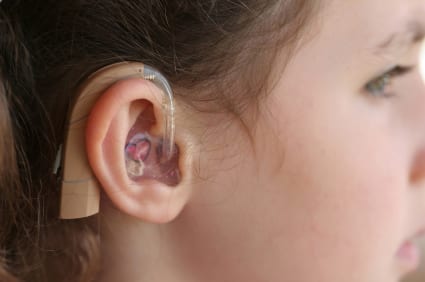
Cisplatin, a cancer chemotherapy drug first approved by the FDA in 1978, revolutionized the treatment of many types of cancer. Despite its effectiveness, in many cases doctors are forced to reduce the drug’s dose, or abandon it altogether, due to serious side effects on patients’ hearing.
Between 10-25% of adults and up to 60% of children being treated with cisplatin suffer from severe, permanent hearing loss in both ears. This is particularly damaging in kids, because even mild hearing loss can negatively impact learning and social development.
Researchers have suggested that genetic variants that affect the metabolism of cisplatin might explain why some people are susceptible to drug-induced hearing loss, while other patients receiving similar doses are not. A new report, published online this week in the journal Nature Genetics, has identified variants in two genes that appear to greatly increase the risk of cisplatin-induced hearing loss. Although the study is a small one, if replicated these findings could one day help doctors make better decisions about how to prescribe cipslatin.
A team led by Colin Ross from the University of British Columbia analyzed the DNA of 162 children (mostly of European ancestry) treated with cisplatin, focusing their search for genetic variants associated with drug-induced hearing loss on 220 genes known to be involved in the absorption, distribution, metabolism and elimination of medications and their breakdown products.
The variants with the largest effects were found in the TPMT gene. One of the variants was associated with increased the odds of cisplatin-induced hearing loss by 10.51 times, although this result was not statistically significant once the researchers adjusted their data to account for the number of SNPs investigated. Other variants that reduced the function of the TPMT enzyme, and have been associated with adverse reactions to a class of drugs called thiopurines that are used as chemotherapy agents and immune system suppressants.
A second SNP associated with cisplatin-induced hearing was in the COMT gene. Having one or two Ts at this SNP increased the odds of hearing loss by 5.52 times. This result was also not statistically significant after adjusting the data.
Other variations in the COMT gene have been associated with a variety of traits, including pain sensitivity, willingness to explore new options, recovery from heart surgery, anxiety, and decreased breast cancer risk in tea drinkers.
None of the SNPs identified in this study were associated with hearing loss in children not treated with cisplatin, suggesting that their effect is specific for drug-induced hearing loss.
“These findings suggest that it may be possible identify individuals at higher risk of cisplatin otoxicity [hearing loss] based on genotype, which would improve counseling and treatment options,” the authors write.
They suggest, for example, that children with the riskier versions of the variants identified in this study could be given lower doses of cisplatin or treated instead with carboplatin, a drug that shows nearly similar cancer cure rates as cisplatin, but has less tendency to cause hearing damage.
The authors acknowledge, however, that their results will need to be replicated in independent populations before any decisions about how to use information about these variants in clinical settings can be made. Research is also needed to understand what, if any, role these variants play in cisplatin-induced hearing loss in adult cancer patients.
Note: Recent studies by other researchers showed that variations in the megalin gene, the GSTP1 gene and the GSTM1 gene were also associated with the risk of cisplatin-induced hearing loss. The current report from Ross et al. failed to replicate these associations.



